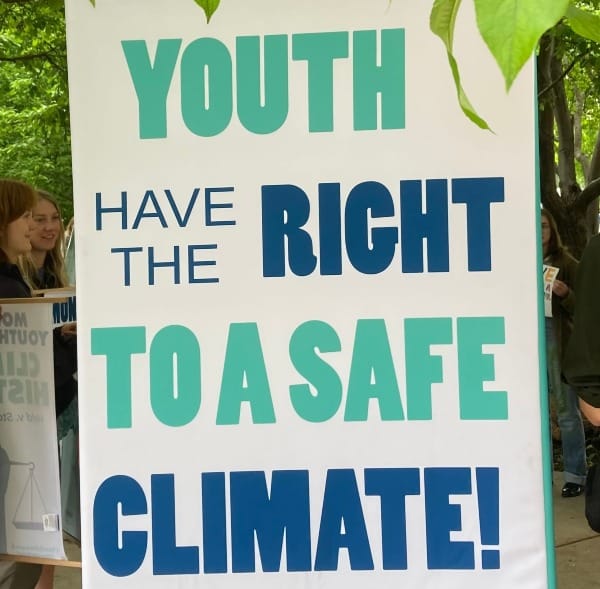Oregon County Sues Fossil Fuel Entities And Enablers For Contributing To Deadly 2021 Heatwave

Story originally published in DeSmog
Major fossil fuel entities and trade associations including Koch Industries, the American Petroleum Institute, and the Western States Petroleum Association, as well as consulting behemoth McKinsey & Company, were slapped with the latest climate liability lawsuit today with the filing of a complaint in the Oregon Circuit Court in Multnomah County, Oregon.
The northwestern Oregon county is the state’s most populous and includes the city of Portland. In this new lawsuit, it seeks to hold fossil fuel companies and their “misinformation agents” accountable for the unprecedented 2021 heat dome that saw temperatures in the county reach 116º Fahrenheit. Climate scientists and researchers in attribution science have determined that this extreme heat event would have been “virtually impossible” without anthropogenic climate change, which is driven primarily by burning fossil fuels.
“Multnomah County is utilizing irrefutable climate science to hold corporate polluters accountable for their role in causing a discreet and disastrous event, as well as recent wildfires,” attorney Roger Worthington — a partner at Worthington & Caron, one of the firms representing the county — stated in a press release.
“This lawsuit is about accountability and fairness, and I believe the people of Multnomah County deserve both. These businesses knew their products were unsafe and harmful, and they lied about it,” added Jessica Vega Pederson, chair of the Multnomah County Board of County Commissioners, in the press release.
Named defendants in Multnomah County’s lawsuit include ExxonMobil, Chevron, BP, Shell, ConocoPhillips, Motiva, Occidental Petroleum, Anadarko Petroleum, Space Age Fuel, Valero Energy, Total Specialties USA, Marathon Petroleum, Peabody Energy, Koch Industries, American Petroleum Institute, Western States Petroleum Association, and McKinsey & Company. DeSmog reached out to the American Petroleum Institute, Western States Petroleum Association, McKinsey & Company, ExxonMobil, and Chevron for comment.
“Suits like these continue to waste time, resources and do nothing to address climate change. This action has no impact on our intention to invest billions of dollars to leading the way in a thoughtful energy transition that takes the world to net zero carbon emissions,” an ExxonMobil spokesperson said via email.
It is the first time that McKinsey & Company has been named as a defendant in a climate accountability lawsuit. It is also the first climate case to name the WSPA as a defendant; other climate cases filed by California communities have invoked the Big Oil trade association — which spent more than any other group lobbying in California last year — as a relevant non-party.
McKinsey & Company has a sordid history of working with industries that have deliberately deceived the public about the harms of their products, from Big Tobacco to opioid manufacturers. The consulting firm has also served the fossil fuel industry. As explained in the 2022 book When McKinsey Comes to Town, since 2010, McKinsey has worked for at least 43 of the 100 largest corporate carbon polluters. These companies, “when accounting for the customers who use their products, were responsible for more than 36 percent of the planet’s greenhouse gas emissions from fossil fuels in 2018,” authors Walt Bogdanich and Michael Forsythe write. Chevron, one of the defendants in the new case, has been one of McKinsey’s biggest clients, generating at least $50 million in consulting fees in 2019.
The targeting of a consulting firm working for fossil fuel clients may be just the beginning of efforts to hold those enabling the industry accountable through litigation, according to Ben Franta, senior research fellow and head of the Climate Litigation Lab at Oxford University.
“Fossil fuel majors have collaborated with ad agencies, public relations firms, and others over the decades to create misleading public communications campaigns,” he told DeSmog. “Much as the consulting firm McKinsey has faced liability in the context of opioid litigation, third parties beyond fossil fuel producers might conceivably face liability in the context of climate litigation.”
The lawsuit filed by Multnomah County brings charges of public nuisance, negligence, and fraud. It seeks $50 million in actual damages and $1.5 billion in future damages. Additionally, the county seeks $50 billion in costs for an abatement model to study, plan, and upgrade public healthcare services and infrastructure to safeguard against future extreme heat events.
Deadly and Record Breaking
The Pacific Northwest heat dome, which developed nearly two years ago to the day, broke all-time temperature records for the region and was the most extreme heat event in Multnomah County’s history. Temperatures in Portland, Oregon, climbed to a scorching 116º Fahrenheit on June 28, 2021, and the temperature readings were recorded at 108° Fahrenheit and 112° Fahrenheit in the preceding days. The blistering heat was linked to the deaths of 69 people and caused property damage and significant expenditure of county resources, according to a county news release.
Montana-based climate scientist Steven Running said during a youth climate trial last week in Helena, Montana, that this extreme heat dome is an “example of the sort of thing that may happen in the future [under climate destabilization]. As long as fossil fuel emissions continue, “the Earth will keep trapping this additional heat and then periodically we will end up with surprises like this,” he testified.
“The heat dome that cost so much life and loss was not a natural weather event,” the lawsuit asserts. “Rather, the heat dome was a direct and foreseeable consequence of the Defendants’ decision to sell as many fossil fuel products over the last six decades as they could and to lie to the County, the public, and the scientific community about the catastrophic harm that pollution from those products into the Earth’s and the County’s atmosphere would cause.”
Vega Pederson, board chair of the Multnomah County Board of Commissioners, said the lawsuit is about leveling the playing field and making corporate polluters pay for the damage their products cause.
“They have profited massively from their lies and left the rest of us to suffer the consequences and pay for the damages. We say enough is enough.”


